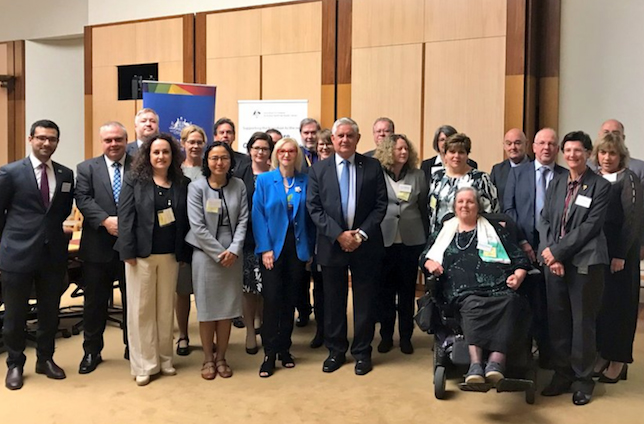New Aged Care Quality Standards for Australia
By Ilsa Hampton, CEO of Meaningful Ageing Australia
The Australian Government Department of Health (the department) has now released a single set of quality standards that is attempting to better reflect the expectations of older people and reduce unnecessary red-tape for providers. The legislation that recently passed through parliament means that understanding each person’s spirituality is no longer an optional extra. Meaningful Ageing Australia is delighted to have been a voice for positive change in this regard.
The same Department of Health funded a project to develop National Guidelines for Spiritual Care in Aged Care (the Guidelines) launched in August 2016. The Guidelines reflect best-practice in spiritual care. They were developed following a literature review to establish an evidence-based framework, and fieldwork that involved close consultation with experts and the sector. The Guidelines describe spiritual care as:
…caring for the whole person holistically incorporating the needs of mind, body and spirit. This holistic approach can enhance spiritual wellbeing and improve health and quality of life. Spiritual care recognises and responds to a person’s spiritual needs by supporting them to find meaning, purpose, hope and transcend loss, grief, disability, illness and pain. [1]
Spiritual care is therefore intrinsic to enabling wellbeing and quality of life. It is inherently collaborative and profoundly person-centred, given the terrain it occupies of meaning, purpose and connectedness in the lives of people from all walks of life. It is fundamental to a person’s identity. Spirituality, however, is not widely understood in its broadest terms. It is often confused with religion, which is a related concept. The National Guidelines for Spiritual Care in Aged Care describe the difference between these two as follows:
The distinctions between religious and spiritual care can be defined as: Spiritual care…[is]…the umbrella term of which religious care is a part. It is the intention of religious care to meet spiritual need. Religious care is given in the context of shared religious beliefs, values, liturgies and lifestyle of a faith community. Spiritual care is not necessarily religious. Religious care should always be spiritual.[2]
A risk that has was identified in the process of creating the National Guidelines for Spiritual Care in Aged Care was that in many cases basic spiritual need is not met. The new Quality Standards are a bold attempt to re-align government subsidised aged care to be more closely fitted to understanding each person, including their spirituality. There are many aspects of the new Standards where spiritualty and spiritual care can make a contribution, for example:
- Maintain an older person’s identity (Standard 1)
- Help older people to make connections with others (Standard 1)
- Partner with consumers (Standard 2)
- Optimise health and wellbeing (Standard 2, 3, 4)
- Understand what is ‘right’ for each consumer (Standard 3)
- Understands each person’s needs, goals and preferences (Standards 3, 4)
- Optimise quality of life (Standard 4) Requirement: (b) services and supports for daily living promote each consumer’s emotional, spiritual and psychological well-being
- Creates a sense of belonging and safety (Standard 5, 6)
- Have a workforce that is caring, respectful, embracing each person’s identity, culture and diversity (Standard 7)
The Guidance Material developed by the Australian Aged Care Quality Agency in consultation with Meaningful Ageing Australia and others explains to providers how to interpret the Standards, for example:
“Consumers who need help to stay at home or who live in residential care could also be experiencing a reduced sense of purpose and meaning. Approaches that promote emotional, spiritual and psychological well-being will minimise the risk of stress, depression or anxiety, and help consumers experience meaning and purpose. This could be through specific pastoral care, cultural, or religious activities that are meaningful to the individual consumer, or through everyday encounters that promote a sense of connection and community….Promoting empathy, compassion and connection between the consumer and members of the workforce in their day to day interactions, will support this approach” (Australian Aged Care Quality Agency Guidance and Resources for Providers to support the new Aged Care Quality Standards August 2018, p78).
There are numerous other references to key concepts that are integral to spirituality such as purpose and identity, meaningful relationships, meaningful activities and more. Further details and support materials are available for our members from the Meaningful Ageing Australia website: https://meaningfulageing.org.au/product/single-aged-care-quality-framework-spiritual-care/
I am looking forward to presenting on this important initiative for Australians accessing aged care at the International Conference on Spirituality and Ageing in Canberra 2019.
Picture: Hon Ken Wyatt, AM MP Minister for Senior Australians and Aged Care, thanks contributors to the new Quality Standards at Parliament House in Canberra in November 2018.
[1] Meaningful Ageing Australia, (2016). National Guidelines for Spiritual Care in Aged Care. Meaningful Ageing Australia, Parkville, p23.
[2] National Guidelines, p.8

